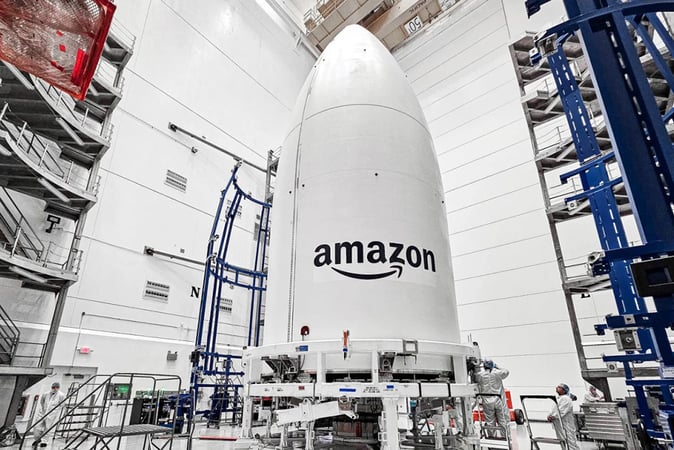The company initially planned to test its internet satellites aboard ULA’s new Vulcan rocket earlier this year. However, the e-commerce giant faced an unforeseen setback when the rocket experienced an explosion.
Amazon is set to take its internet satellite “Project Kuiper” on its first mission to space on Friday, October 6. In a recent announcement on Tuesday, the company said that Project Kuiper will be taking a “protoflight” mission into space with the launch of two test satellites, KuiperSat-1 and KuiperSat-2.
The e-commerce giant aims to compete with SpaceX’s Starlink by creating a constellation of over 3,200 satellites in low Earth orbit, providing high-speed internet connectivity to remote and underserved areas. The move has placed the company in direct competition with other key players in the field, including HughesNet, EarthLink and Viasat.
Amazon’s Satellite on First Mission to Space
The launch of the satellites in space signifies an important milestone for Amazon, as it is its first time engaging in such a venture.
Rajeev Badyal, the vice president of technology for Project Kuiper, acknowledged that it’s the company’s first time putting satellites into space. He also disclosed that Amazon has completed the testing of Project Kuiper at the laboratory and is now set to embark on its first mission to space.
“We’ve done extensive testing here in our lab and have a high degree of confidence in our satellite design, but there’s no substitute for on-orbit testing. This is Amazon’s first time putting satellites into space, and we’ll learn an incredible amount regardless of how the mission unfolds,” Badyal said.
According to the company’s announcement, the launch window for Project Kuiper is scheduled to open at 2 PM ET, with the Atlas V rocket deploying the satellites at an altitude of 311 miles at approximately 500 kilometers, placing them in a low Earth orbit.
Amazon’s First Satellite Launch to Take Place in Florida
Amazon said the United Launch Alliance’s (ULA) Atlas V rocket will carry the two satellites into orbit from Cape Canaveral Space Force Station in Florida at the scheduled time tomorrow.
During the mission, the team behind the project will conduct a series of critical tests. These tests include establishing initial contact with the satellites, deploying solar arrays to generate power, and ensuring the proper functioning of onboard electronics.
Once the satellites are connected to the internet, the team will also test data transfer capabilities between the satellites and Earth-based customer terminals.
As part of its commitment to space safety, Amazon said it plans to deorbit both satellites after the mission before they ultimately burn up in the Earth’s atmosphere.
Amazon Could Launch Project Kuiper Early Next Year
The company initially planned to test its internet satellites aboard ULA’s new Vulcan rocket earlier this year. However, the e-commerce giant faced an unforeseen setback when the rocket experienced an explosion.
The company responded to this challenge by changing its plans and opting to use the ULA’s reliable Atlas V rocket as an alternative satellite launch vehicle.
Despite the initial challenges, Amazon remains resolute in its commitment to Project Kuiper’s ambitious timeline.
The company said the satellite could still launch during the first quarter of next year. If successful, the move will mark a significant step toward making high-speed satellite-based internet connectivity a reality for users worldwide.
“Our first production satellites are on track for launch in the first half of 2024, and we expect to be in beta testing with early commercial customers by the end of 2024,” wrote Amazon.
Chimamanda is a crypto enthusiast and experienced writer focusing on the dynamic world of cryptocurrencies. She joined the industry in 2019 and has since developed an interest in the emerging economy. She combines her passion for blockchain technology with her love for travel and food, bringing a fresh and engaging perspective to her work.




